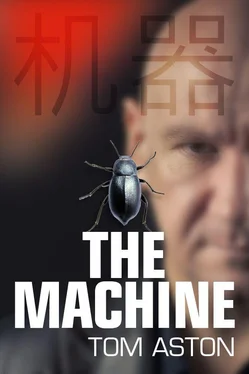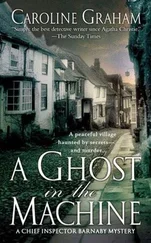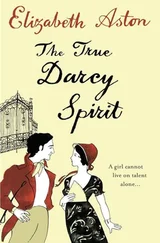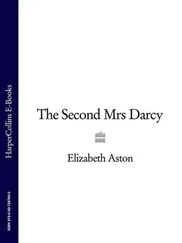Tom Aston - The Machine
Здесь есть возможность читать онлайн «Tom Aston - The Machine» весь текст электронной книги совершенно бесплатно (целиком полную версию без сокращений). В некоторых случаях можно слушать аудио, скачать через торрент в формате fb2 и присутствует краткое содержание. Жанр: Триллер, на английском языке. Описание произведения, (предисловие) а так же отзывы посетителей доступны на портале библиотеки ЛибКат.
- Название:The Machine
- Автор:
- Жанр:
- Год:неизвестен
- ISBN:нет данных
- Рейтинг книги:4 / 5. Голосов: 1
-
Избранное:Добавить в избранное
- Отзывы:
-
Ваша оценка:
- 80
- 1
- 2
- 3
- 4
- 5
The Machine: краткое содержание, описание и аннотация
Предлагаем к чтению аннотацию, описание, краткое содержание или предисловие (зависит от того, что написал сам автор книги «The Machine»). Если вы не нашли необходимую информацию о книге — напишите в комментариях, мы постараемся отыскать её.
The Machine — читать онлайн бесплатно полную книгу (весь текст) целиком
Ниже представлен текст книги, разбитый по страницам. Система сохранения места последней прочитанной страницы, позволяет с удобством читать онлайн бесплатно книгу «The Machine», без необходимости каждый раз заново искать на чём Вы остановились. Поставьте закладку, и сможете в любой момент перейти на страницу, на которой закончили чтение.
Интервал:
Закладка:
Giyenchen’s face was one that stays in the mind. It had an aura of the saintly. A benign smile, an unknowable contentment. Giyenchen was in his mid-forties, Stone guessed, and his skin was brown and smooth, with small crow’s feet around the eyes from smiling. Neither young nor old. His head was shaven, of course, with signs of grey stubble by the ears, and he wore black-rimmed spectacles. It was a face which carried its own peace, as if the decades of incantations and meditation had been absorbed into the skin. Giyenchen looked kindly, benign, and also wise. His movements were slow and precise, as was his spoken English. Giyenchen gave the impression that words were moving through him from somewhere else, so impassive was his expression.
Stone took the opportunity to steer the talk in a suitable direction. ‘You are very lucky to live in this place. A heaven on earth.’
Giyenchen nodded and smiled.
‘I heard there were mine workings here,’ Stone continued. ‘But I cannot see any sign.’
‘You are most well informed,’ said Giyenchen. He showed some surprise but smiled through it. ‘There were indeed mines in this area, some years ago,’ he said, his words pouring in a smooth rhythm. ‘It was known as an area for rare minerals. For silver, gold and lead also.’ Stone was reminded of the place names on Semyonov’s scribblings: Silvermine Field, Ironstone Forest . ‘However, the mines themselves are long closed, and have not been on any map for forty years. It is good for us. But I ask myself how you knew this.’
‘I haven’t seen a map,’ said Stone. It was true. There were no decent maps, but Ying Ning had pieced together a map of the area from older ones. ‘Where are the mines? Are they covered over by the forest?’
‘Seven kilometres from here, over the hill to the Northwest,’ he said, smoothly once more. ‘But. It is forbidden to go there.’
‘Forbidden?’ said Carslake. ‘How come?’
‘ Karma ,’ said the monk. He didn’t hesitate, this guy. There was something robotic in his lack of reaction, his smoothness. ‘It is forbidden to the monks. We try hard, Mr Carslake, to keep our good karma . We pray, we recite the mantras, we read the sutras. We live with our minds pure and our bodies cleansed,’ he said, and his eyes closed. ‘I myself have not eaten meat for thirty-four years. Why should we make such efforts to be clean, only to pollute ourselves at the scene of such evil?’
‘Evil?’ asked Carslake, his eyebrows raised. ‘What evil?’
Giyenchen shrugged. ‘Is it evil, or poison or simply death? It does not concern us, and it pollutes us to think of it. If you saw that place, it would be clear to you. This place, this valley, gentlemen, is a sea of beauty and fertility. That is why the monastery is here. It is a place of abundance and joy, far, far from the samsara of the world, far from the cities and their cycle of birth and death and want and suffering. Our task as monks is to live in ignorance of this samsara .’
‘In ignorance of suffering, you mean?’ asked Stone. ‘That’s what samsara means, isn’t it?’
‘Yes. Suffering and the bad things of the world. If we stay ignorant of suffering, if we avoid it, we may find enlightenment,’ said the monk, nodding benignly. ‘ Nirvana is of this kind.’ There was silence again. Giyenchen sipped some tea and closed his eyes, as if looking at nirvana itself.
Sometimes, Stone wanted to close his own eyes. His life was the opposite of Giyenchen. It was about escaping one conflict by looking for another, escaping his own guilt by finding even greater guilt in others. Everywhere he saw suffering, because everywhere he looked for suffering. It wasn’t nirvana , or enlightenment. But in that second he felt he wanted to copy Giyenchen, and close his eyes on the conflict and suffering. It wouldn’t need a monastery. Just a regular job, a woman, a few friends. Close your eyes and it can happen , the monk seemed to say.
Stone looked at the smooth skin of Giyenchen’s closed eyelids behind the glasses. The closed eyes of the monk burned into him, more than the staring, glittering eyes of any assassin or terrorist. It felt like the monk had looked for a second on Stone’s guilt-scarred, wounded soul, just for an instant. And Stone hated it.
‘And that is why you will not talk of that place?’ asked Stone, glad to shake off the feeling. ‘The place which is forbidden?’
The monk nodded slowly. ‘If I tell you what I know of the place,’ he said. ‘The words pollute me, but they pollute you also. It is the place of samsara .’
‘Try us,’ said Carslake, ‘We’re polluted already. Trust me.’
In Stone’s case, Carslake could have no idea how true that was.
Giyenchen stood, and pottered about the room in silence, lighting more incense and candles as the darkness gathered outside. In the end he began to speak through the wisps of smoke, the glow of the candles on his smooth brow.
‘I can say these things,’ he said. ‘But I must beg you not to interrupt.’
Chapter 45 — 5:36pm 8 April — Shanglan Monastery, Garze Autonomous Prefecture, Sichuan, China
The head monk Giyenchen sat meditating for a couple of minutes, eyes closed behind his glasses. He made a faint humming sound. Stone and Carslake looked at each other, but neither spoke. Dusk was closing in outside, and the tiny room was dark save for the glow of the incense and the guttering flames of the candles.
‘In 1966,’ said the monk, breaking suddenly into speech, ‘China was not the peaceful place it is today. It was the Cultural Revolution. A madness of suffering. Workers were turned on their managers, pupils denounced their teachers, people of learning were sent to labour camps. Religion was proscribed. Temples were closed, Christians and Muslims could no longer worship, and vulgar mobs came to drive the monks from the temples. Our temple here at Shanglan was abandoned and the monks sent to work in the fields. For ten years Shanglan lay empty.
‘When the monks returned, they discovered the place the Chinese called the Death Hole had expanded from a few disused mine buildings. For many hectares nothing grew. As nothing grows there now. Whether for reason of poison or evil, we don’t know, but this place is very near to the Shanglan itself…’
‘But what..?’ began Carslake.
Giyenchen held up a palm to silence the American. ‘Please,’ he said. ‘Do not interrupt. There were mines here, it’s true, since the Manchu times. But not this. Some say they tested their atomic weapon there.’
‘A nuclear test?’ asked Carslake.
‘Others said it was to create a hole for mining, still others said it was an explosion to destroy the mine, to seal the mine forever. However, the hole is still there, and nothing grows. One of the Communist leaders, Lin Biao, it is said, ordered the mine dug out again. He had deep shelters and bunkers dug all over China, convinced the Americans or Soviets would attack with their missiles. That at least is true. Lin Biao had the mine begun again in 1969. Hundreds of miners lost their lives,’ said Giyenchen, ‘But deep workings were created. Lin Biao, of course, was an evil creature, swept away in the disturbances of those times. The popular politician Zhou Enlai ended the work at the mine in 1970. He ordered it to be fenced and guarded, and so it remains to this day.’
‘It has stayed that way since… 1976, when the monks returned?’ asked Stone.
Giyenchen nodded.
‘No activity in recent times?’
The monk said nothing, but he opened his eyes and looked accusingly. ‘Let us speak no more of it. And you must not speak of it to your Chinese companion.’
Читать дальшеИнтервал:
Закладка:
Похожие книги на «The Machine»
Представляем Вашему вниманию похожие книги на «The Machine» списком для выбора. Мы отобрали схожую по названию и смыслу литературу в надежде предоставить читателям больше вариантов отыскать новые, интересные, ещё непрочитанные произведения.
Обсуждение, отзывы о книге «The Machine» и просто собственные мнения читателей. Оставьте ваши комментарии, напишите, что Вы думаете о произведении, его смысле или главных героях. Укажите что конкретно понравилось, а что нет, и почему Вы так считаете.








